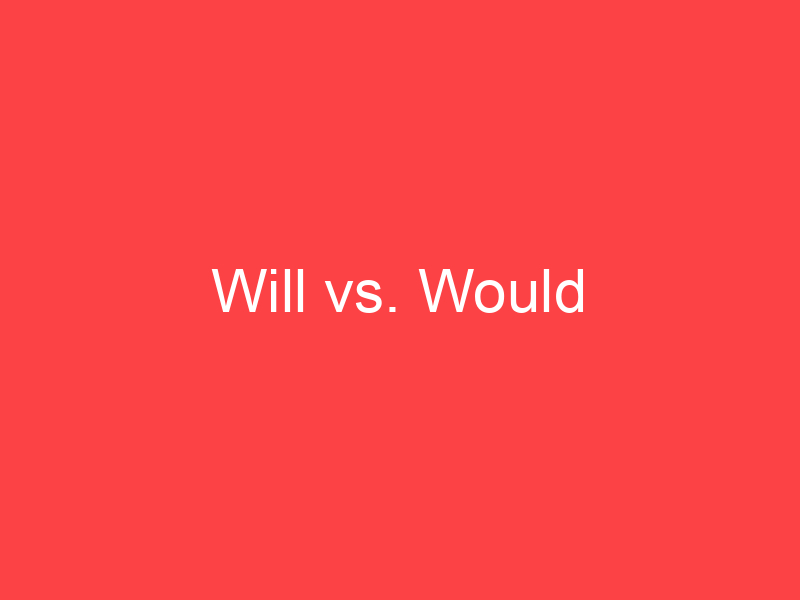-
Will (verb)
To wish, desire (something). 9th-18th c.
“Do what you will.”
-
Will (verb)
To wish or desire (that something happen); to intend (that). 9th-19th c.
-
Will (verb)
To habitually do (a given action). from 9th c.
-
Will (verb)
To choose to (do something), used to express intention but without any temporal connotations (+ bare infinitive). from 10th c.
-
Will (verb)
Used to express the future tense, sometimes with some implication of volition when used in the first person. Compare shall. from 10th c.
-
Will (verb)
To be able to, to have the capacity to. from 14th c.
“Unfortunately, only one of these gloves will actually fit over my hand.”
-
Will (verb)
To wish, desire. 9th–19th c.
-
Will (verb)
To instruct (that something be done) in one’s will. from 9th c.
-
Will (verb)
To try to make (something) happen by using one’s will (intention). from 10th c.
“All the fans were willing their team to win the game.”
-
Will (verb)
To bequeath (something) to someone in one’s will (legal document). from 15th c.
“He willed his stamp collection to the local museum.”
-
Will (noun)
One’s independent faculty of choice; the ability to be able to exercise one’s choice or intention. from 9th c.
“Of course, man’s will is often regulated by his reason.”
-
Will (noun)
One’s intention or decision; someone’s orders or commands. from 9th c.
“Eventually I submitted to my parents’ will.”
-
Will (noun)
The act of choosing to do something; a person’s conscious intent or volition. from 10th c.
“Most creatures have a will to live.”
-
Will (noun)
A formal declaration of one’s intent concerning the disposal of one’s property and holdings after death; the legal document stating such wishes. from 14th c.
-
Will (noun)
That which is desired; one’s wish. from 10th c.
-
Will (noun)
Desire, longing. (Now generally merged with later senses.) from 9th c.
“He felt a great will to make a pilgrimage to the Holy Land.”
-
Would (verb)
As a past-tense form of will.
-
Would (verb)
Wished, desired (something). 9th-19thc.
-
Would (verb)
Wanted to ( + bare infinitive). from 9thc.
-
Would (verb)
Used to; was or were habitually accustomed to ( + bare infinitive); indicating an action in the past that happened repeatedly or commonly. from 9thc.
-
Would (verb)
Used with bare infinitive to form the “anterior future”, indicating a futurity relative to a past time. from 9thc.
-
Would (verb)
Used with ellipsis of the infinitive verb, or postponement to a relative clause, in various senses. from 9thc.
-
Would (verb)
As a modal verb, the subjunctive of will.
-
Would (verb)
Was determined to; loosely, could naturally have been expected to (given the tendencies of someone’s character etc.). from 18thc.
-
Would (verb)
Used to give a conditional or potential “softening” to the present; might, might wish. from 9thc.
-
Would (verb)
Used as the auxiliary of the simple conditional modality (with a bare infinitive); indicating an action or state that is conditional on another. from 9thc.
-
Would (verb)
Might wish ( + verb in past subjunctive); often used in the first person (with or without that) in the sense of “if only”. from 13thc.
-
Would (verb)
Used to impart a sense of hesitancy or uncertainty to the present; might be inclined to. Now sometimes colloquially with ironic effect. from 15thc.
-
Would (verb)
Used interrogatively to express a polite request; are (you) willing to …? from 15thc.
“Would you pass the salt, please?”
-
Would (noun)
Something that would happen, or would be the case, under different circumstances; a potentiality.
-
Would (verb)
past of will, in various senses
“the windows would not close”
“he said he would be away for a couple of days”
“she wouldn’t leave”
-
Would (verb)
(expressing the conditional mood) indicating the consequence of an imagined event or situation
“he would lose his job if he were identified”
-
Would (verb)
used to give advice
“I wouldn’t drink that if I were you”
-
Would (verb)
expressing a desire or inclination
“I would love to work in America”
“would you like some water?”
-
Would (verb)
expressing a polite request
“would you pour the wine, please?”
-
Would (verb)
expressing willingness or consent
“who would live here?”
-
Would (verb)
expressing a conjecture, opinion, or hope
“I would imagine that they’re home by now”
“I guess some people would consider it brutal”
“I would have to agree”
-
Would (verb)
used to make a comment about behaviour that is typical
“they would say that, wouldn’t they?”
-
Would (verb)
expressing a wish or regret
“would that he had lived to finish it”

